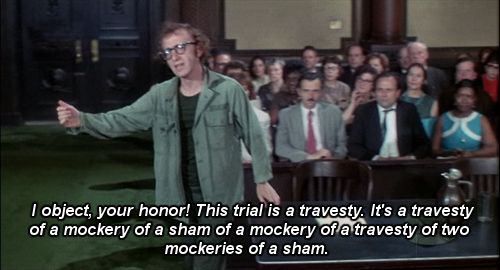By Judge Dale Tipps, Murfreesboro
 I recently gave a presentation on practice tips at the Bureau’s annual Educational Conference. It was such a triumph that I’m going share some of it here. (“Triumph” means I finished on time and no one fell asleep.)
I recently gave a presentation on practice tips at the Bureau’s annual Educational Conference. It was such a triumph that I’m going share some of it here. (“Triumph” means I finished on time and no one fell asleep.)
- Ask the Question.

Some of us think of these TV doctors…
Specifically, ask the doctor. Many expedited hearings could be avoided if one of the parties would simply ask the ATP for a causation opinion. If you come to a hearing with no causation opinion on an undisputed work incident, there’s a very strong chance you’re going to have to send the employee back to the ATP. Go ahead; ask the doctor. You can handle the truth.

While McDreamy comes to mind for our younger readers.
- Don’t Ask the Question.
We all know the old saw about not asking a question you don’t already know the answer to. What I’m talking about is not asking a question that you don’t need an answer to. Once the medical records have been admitted, it’s usually unnecessary and often a mistake to ask the witness about something contained in the records.
“Isn’t it true that Dr. Smith’s records show that you made no shoulder complaints until two months after the accident?” Because they’re already in evidence, what do you gain by asking the witness to confirm what the records contain? At the least, this is a likely a waste of time. At worst, you’ve now given them a chance to explain the discrepancy.
- Just Because You Can Object, Doesn’t Mean You Must.
Ask yourself if the testimony is going to hurt your case. If not, let it go. But if you do object, state your grounds. A corollary is to take the low-hanging fruit: That is, make your easiest objection first.

- You Can Unring the Bell (sort of).
I know attorneys are worried that all the information filed with the mediator is included in the Dispute Certification Notice. I have a new perspective after two years on the bench. The keyword here may be “bench,” as in, “no jury.”
It turns out it’s just not that hard for a judge to disregard documents and statements that aren’t admitted as evidence. Even if I can see that the result might have changed if the parties had authenticated a document, it’s not difficult to find that, in the absence of that document, a party hasn’t proven his or her case. Relax about information that isn’t properly before the Court.
- Skip the Unnecessary Filings.
Don’t file deposition notices, discovery, etc. with the Clerk. If it isn’t asking the Court to act, or isn’t documentation necessary for the Court to decide some issue, please don’t file it.
- Approach Medical Histories Strategically.
Newsflash: They sometimes Contain Errors. I often see claims denied because the medical records contained eight entries of “left” elbow and one of “right” elbow. Or “three weeks ago” instead of “two weeks ago.”

Not the actual bear in question.
I had one case where the employee was injured running away from a bear. The employer questioned the accuracy of the records because, even though they all referenced a bear-related injury, only one of them indicated the employee had thrown his fried chicken at the bear. In all honesty, who cares? You had me at “bear.”
Before you hang your compensability defense on medical histories, consider whether the discrepancies are truly material.
- Know When to Stop.
Why are you asking this witness the same questions as the other witness, when there is no dispute over the fact you’re asking about? Why are you asking this witness to confirm the information in the medical records that have already been admitted? Obviously, you normally have to prepare these questions, but feel free to not ask them once it’s clear that the issue is undisputed.
- Steer Clear of the Kitchen Sink.
More is not necessarily better. If the testimony of one witness establishes a fact for which there will be no rebuttal, presenting additional witnesses or proof on that particular fact wastes time and may be distracting. This is also true of the issues you choose to raise. You’ll probably do better if you focus on the issues you can actually win, instead of diluting your case with arguments that are irrelevant or unlikely to succeed.
- Avoid Unsubstantiated Allegations or Conspiracy Theories.
 Suggesting the employee is lying, malingering, or is unkind to children and small animals, but presenting no proof of those things, won’t improve your case. In fact, the Court might respond negatively.
Suggesting the employee is lying, malingering, or is unkind to children and small animals, but presenting no proof of those things, won’t improve your case. In fact, the Court might respond negatively.
- Be Kind and Keep it Impersonal.
This is not so much a moral issue, but a strategic one. The honey/vinegar thing. If you are nice to the self-represented employee, I believe you increase your chances of success – not just in mediation but in trial.
Repeatedly denigrating a party or their position is not helpful or persuasive. Calling someone’s claim “fraudulent” just because you feel their proof is insufficient or because your expert disagrees is not helpful or persuasive. Likewise, calling their expert a “hired gun” is not helpful or persuasive, especially when you’ve submitted a report or IME from your own compensated expert.

In conclusion, remember that these are just my suggestions. I’ve seen a lot of lawyering in my hearings over the last couple of years. I’ve seen mostly good things . . . and some, well, not so much. From where I sit these days, some of these tips have the potential of improving your outcomes. They just might also make your practice more enjoyable.

One thought on “Ten Tips for Better Trial Practice”